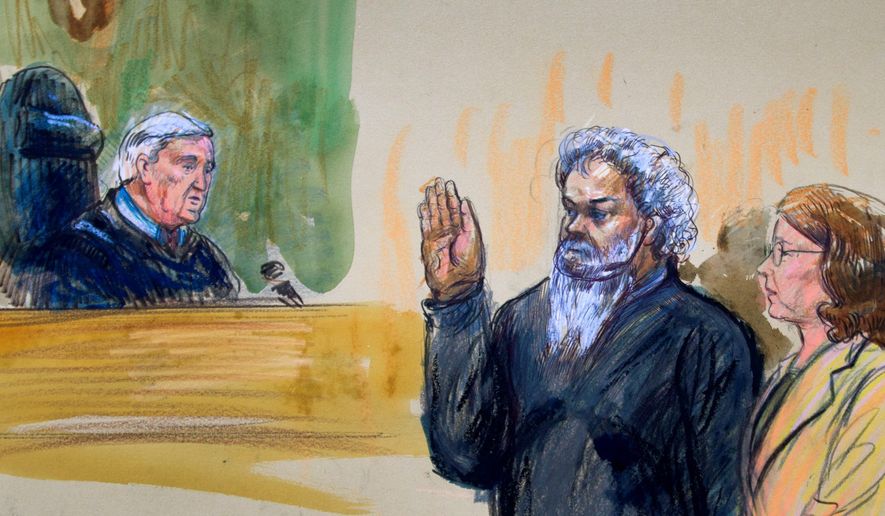The criminal trial of the accused mastermind of the 2012 deadly attack on a U.S. mission in Benghazi, Libya, opened Monday with prosecutors alleging that Ahmed Abu Khatallah planned and encouraged the attack because he “hates Americans with a vengeance.”
Prosecutors said Mr. Abu Khatallah didn’t start the fires whose smoke killed Ambassador J. Christopher Stevens and U.S. information management officer Sean Smith, nor did he fire the mortar rounds that struck security officers Tyrone Woods and Glen Doherty. Rather he “incited others to do his dirty work,” said Assistant U.S. Attorney John Crabb.
The government laid out their evidence during opening statements Monday, playing snippets of security footage that showed Mr. Abu Khatallah walking into the Benghazi mission with an AK-47 in hand after the gates to the complex were breached in the Sept. 11, 2012, attack.
Prosecutors said witnesses will testify about preparations Mr. Abu Khatallah made before the attack, such as stocking up on weapons, with associates who were on scene that night, and comments he made afterward about his responsibility.
One key witness, referred to as “Ali,” was paid $7 million by the U.S. government for providing information to investigators, Mr. Crabb said. Ali befriended Mr. Abu Khatallah after the attack at the request of the U.S. government and provided details about his whereabouts and ultimately arranged the 2014 trip during which the military captured Mr. Abu Khatallah.
Mr. Crabb said Ali will testify that at a meeting in Libya, Mr. Abu Khatallah said he “attacked the American embassy” and later told Ali privately that “he would have killed all the Americans that night … if others had not gotten involved and stopped me.”
But defense attorneys questioned the motivation of the witnesses involved in the case, as well as why Mr. Abu Khatallah is the only man on trial for the Benghazi attack.
“There are people who are not Ahmed Abu Khatallah who were the masterminds of the attack,” said defense attorney Jeffrey Robinson.
Because that information is classified, the details about some of the other individuals involved in the attack and how the government learned of them will likely not be shared during the course of the trial.
“So why is Mr. Abu Khatallah sitting in that chair?” Mr. Robinson said. “He is sitting there because he was easy.”
Unlike others involved, Mr. Abu Khatallah did not run and hide after the attacks — he even gave statements to local media about the attacks, noting that while he was at the mission he did not participate, Mr. Robinson said.
During opening statements Monday, Mr. Abu Khatallah sat quietly beside his attorneys listening to an Arabic translation of the proceedings through headphones. He wore a white, untucked dress shirt, black pants and sneakers, and had a long white beard.
Mr. Abu Khatallah has pleaded not guilty to the 18 criminal counts, which range from murder of an officer of the United States to conspiracy to provide material support to terrorists. He faces a maximum sentences of life in prison.
A panel of 12 jurors and three alternates, including six men and nine women, are hearing the case.
Legal experts say the trial has the potential to showcase the value of prosecuting terrorism cases in American courts rather than military tribunals and to provide a measure of closure both for victims’ families and the American public. But were Mr. Abu Khatallah to be acquitted, it could also be a huge embarrassment for prosecutors.
Mr. Abu Khatallah’s defense attorneys have tried unsuccessfully to challenge various aspects of his detention and interrogation — including whether his rights were violated when he was questioned by both CIA and FBI officials and transported to the U.S. over a two-week period on a slow-moving Navy ship.
Statements Mr. Abu Khatallah gave to FBI agents during his interview on the ship will be used in the case, though Mr. Robinson noted that the interviews were neither recorded nor video taped and the jury will instead be told what Mr. Abu Khatallah said by the agents — two of whom sat in the courtroom behind prosecutors.
• Andrea Noble can be reached at anoble@washingtontimes.com.




Please read our comment policy before commenting.